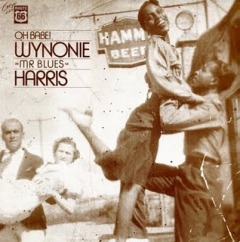Wynonie Harris - Oh Babe! (1982)
Wynonie Harris - Oh Babe! (1982)

01. Around the Clock Parts I & II 02. Cock-A-Doodle-Doo 03. Yonder Goes My Baby 04. Time to Change Your Town 05. Hard Ridin' Mama 06. You Got to Get Yourself a Job, Girl 07. My Baby's Barrel House 08. Oh Babe! play 09. Luscious Woman 10. Bad News Baby There'll Be No Rockin' Tonight 11. Stormy Night Blues play 12. Down Boy Down 13. Git To Gittin' Baby 14. Don't Take My Whiskey Away From Me 15. I Get a Thrill Personnel includes: Wynonie Harris, Joe Turner (vocals); Mary Osborne (guitar); Vincent Bair-Bey, Frank Culley (alto saxophone); Allen Eager, Joe Allston, Dave Brooks, Wesley Brooks (tenor saxophone); William McLemore (baritone saxophone); Hot Lips Page, Cat Anderson, Willie Wells, Frank Galbraith (trumpet); Joe Britton, Alfred Cobbs (trombone); Joe Knight, "Birdie" Wallace (piano); Carl "Flat Top" Wilson, Jimmy Butts, Gene Ramey (bass); Clarence "Bobby" Donaldson, Connie Kay, Kelly Martin, Solomon Hall, James Crawford (drums).
No blues shouter embodied the rollicking good times that he sang of quite like raucous shouter Wynonie Harris. "Mr. Blues," as he was not-so-humbly known, joyously related risque tales of sex, booze, and endless parties in his trademark raspy voice over some of the jumpingest horn-powered combos of the postwar era.
Those wanton ways eventually caught up with Harris, but not before he scored a raft of R&B smashes from 1946 to 1952. He was already a seasoned dancer, drummer, and singer when he left Omaha for L.A. in 1940 (his main influences being Big Joe Turner and Jimmy Rushing). He found plenty of work singing and appearing as an emcee on Central Avenue, the bustling nightlife strip of the Black community there. Wynonie Harris' reputation was spreading fast -- he was appearing in Chicago at the Rhumboogie Club in 1944 when bandleader Lucky Millinder hired him as his band's new singer. With Millinder's orchestra in brassy support, Harris made his debut on shellac by boisterously delivering "Who Threw the Whiskey in the Well" that same year for Decca. By the time it hit in mid-1945, Harris was long gone from Millinder's organization and back in L.A.
The shouter debuted on wax under his own name in July of 1945 at an L.A. date for Philo with backing from drummer Johnny Otis, saxist Teddy Edwards, and trumpeter Howard McGhee. A month later, he signed on with Apollo Records, an association that provided him with two huge hits in 1946: "Wynonie's Blues" (with saxist Illinois Jacquet's combo) and "Playful Baby." Harris' own waxings were squarely in the emerging jump blues style then sweeping the West Coast. After scattered dates for Hamp-Tone, Bullet, and Aladdin (where he dueled it out with his idol Big Joe on a two-sided "Battle of the Blues"), Harris joined the star-studded roster of Cincinnati's King Records in 1947. There his sales really soared.
Few records made a stronger seismic impact than Harris' 1948 chart-topper "Good Rockin' Tonight." Ironically, Harris shooed away its composer, Roy Brown, when he first tried to hand it to the singer; only when Brown's original version took off did Wynonie cover the romping number. With Hal "Cornbread" Singer on wailing tenor sax and a rocking, socking backbeat, the record provided an easily followed blueprint for the imminent rise of rock & roll a few years later (and gave Elvis Presley something to place on the A-side of his second Sun single).
After that, Harris was rarely absent from the R&B charts for the next four years, his offerings growing more boldly suggestive all the time. "Grandma Plays the Numbers," "All She Wants to Do Is Rock," "I Want My Fanny Brown," "Sittin' on It All the Time," "I Like My Baby's Pudding," "Good Morning Judge," "Bloodshot Eyes" (a country tune that was first released on "King" by Hank Penny), and "Lovin' Machine" were only a portion of the ribald hits Harris scored into 1952 (13 in all) -- and then his personal hit parade stopped dead. It certainly wasn't Harris' fault -- his King output rocked as hard as ever under Henry Glover's supervision -- but changing tastes among fickle consumers accelerated Wynonie Harris' sobering fall from favor.
Sides for Atco in 1956, King in 1957, and Roulette in 1960 only hinted at the raunchy glory of a short few years earlier. The touring slowed accordingly. In 1963, his chaffeur-driven Cadillacs and lavish New York home a distant memory, Harris moved back to L.A., scraping up low-paying local gigs whenever he could. Chess gave him a three-song session in 1964, but sat on the promising results. Throat cancer silenced him for good in 1969, ending the life of a bigger-than-life R&B pioneer whose ego matched his tremendous talent. ~ Bill Dahl, Rovi
Zmieniony (Sobota, 22 Grudzień 2012 22:04)








